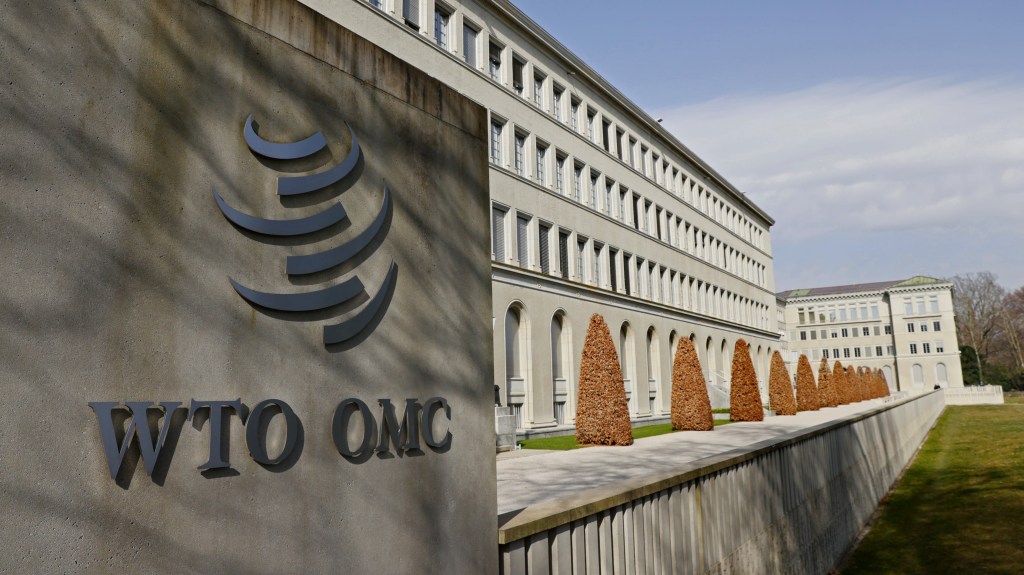India has decided to put its foot down at the World Trade Organisation (WTO) on the issue of farm support. The country won’t negotiate any other agriculture issues at the world body’s upcoming ministerial conference in Abu Dhabi till it gets permanent protection to public procurement of grains through minimum support price (MSP) operations, a senior official said Thursday.
Currently, India is accorded the cover of a “peace clause” or interim relief regarding its MSP operations and public stock-holding of grains. This was first granted in 2013 at the WTO Ministerial Meeting in Bali. Subsequently, in November 2014 this clause was extended till a permanent solution to the vexed issue is found.
“We want to codify (our stance) in terms of a change in schedule of the Agreement on Agriculture. Unless the public stockholding issue is resolved we will not be able to take part in any other discussions on agriculture,” the official said.
Earlier this week, at the preparatory meetings before the 13th ministerial conference in Abu Dhabi between February 26-29, the US had said that it would not be possible to meet India’s demand for a permanent solution for public stockholding at the meeting.
On this issue India is pitted against Cairns Group of agricultural exporting countries which has 19 members including Argentina, Australia, Brazil, Canada, Chile and Colombia. The group has been seeking to curb domestic support that India provides.
According to Cairns Group, procurement at fixed prices and public stock of grains distorts markets. As MSP acts as a price barometer for Indian rice and wheat for exports, it keeps their global prices suppressed, they argue.
They also have a backing some other countries on the issue taking their total to 28. The US and Europe are others who have been against the public stock-holding by India.
India on the other hand has the backing of G-33 developing countries which have defensive interests in agriculture, Africa Group and Organisation of African, Caribbean and Pacific States. In total this brings the number of countries backing India to close to 90. As all decisions at the WTO are taken by consensus the issue will be a hotly contested one.
India has maintained that public procurement and shockholding of food grains serves the twin objective of food security and income support.
As part of the permanent solution to the issue, India wants that the base year of calculating the amount of agriculture subsidies it is allowed under the WTO agreements be revised to the more current one. At present the subsidy is capped at 10% of total production value at 1986-1988 prices.
India’s subsidies on rice of around $ 7 billion cross that limit and is 15% of the production value. In other grains it is below 3%. It is allowed support for all staple food crops like coarse grains and pulses too. Despite exceeding the support allowed in case of rice, India cannot be taken to the dispute settlement mechanism because of the peace clause.
Other support to agriculture like subsidised electricity, fertilisers, irrigation and even direct cash transfers like PM Kisan is in the development box, so cannot be disputed at the WTO, the official said.
Another challenge India faces is on defending its export restrictions on food grains. While India has maintained that these are used for domestic food security, the European Union, US, UK, Japan, Australia, Costa Rica label it as a major factor for global food insecurity.
They are building a market-oriented narrative of food security that involves making export restrictions more difficult to use. They are asking for greater transparency in export restrictive measures and a month’s notice before being brought into play. India’s stand is that its public stockholding and other agricultural policies have kept global prices within reach of everyone.
The global trade in foodgrains is 30 million tonnes. If India enters the market to meet just 10% of the demand, which comes to 25 million tonnes, it will spark off a crisis.
India on its part would challenge the room Europe and US has on Agriculture Market Support. While on each product their subsidy is capped at 5% the US has room to provide $19 billion Agriculture Marketing Support (AMS) while Europe has $ 72 billion. These large sums can be allocated to any commodity which can then kill markets in many smaller countries.
India would defend its entitlement for Special Safeguard Mechanism in agriculture that puts different levels of obligations on members.

